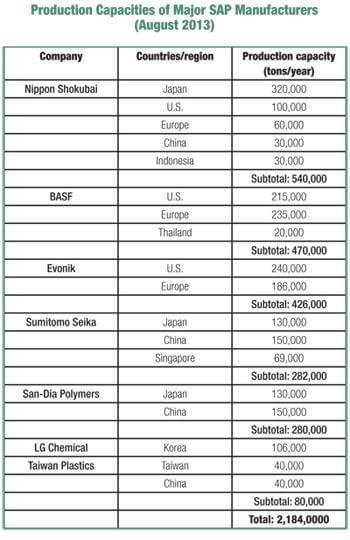Get Free Sample
 Table one shows the production capacity of the world’s largest producers of superabsorbent polymers in the world. The total production of seven companies on the list totals nearly 2.2 million tons as of August 2013. In spite of the increased capacity of 14.2% in April 2012, demand for SAP outpaces supply globally.
Table one shows the production capacity of the world’s largest producers of superabsorbent polymers in the world. The total production of seven companies on the list totals nearly 2.2 million tons as of August 2013. In spite of the increased capacity of 14.2% in April 2012, demand for SAP outpaces supply globally.
This shortage can be partially attributed to an accident at Nippon Shokubai’s Himeji workshop in 2012 that subsequently led to the shutdown of 320,000 tons in September 2012. Although a portion of this operation was restarted in June 2013, it is currently only able to make 180,000 tons per year. To compensate for this shortage, Nippon Shokubai accelerated its expansion in Tennessee, adding 40,000 tons last year and bringing its total U.S. capacity to 100,000 tons. The company also makes 60,000 tons of SAP in Texas.
Nippon Shokubai has also been expanding its Far East presence with a 90,000-ton plant in Indonesia. So far about 30,000 tons of that capacity is up and running.
Meanwhile, the world’s second largest SAP producer BASF makes 470,000 tons of SAP per year with sites in the U.S., Europe and Thailand. Recent investments in the U.S. and Europe allowed BASF to outrank Evonik, the former number two player. Evonik makes 426,000 tons of SAP per year at plants in the U.S. and Europe.
Capacity expansion among the industry’s other leading players includes expansions in Japan and Europe by Sumitomo Seika and expansions by LG Chemical in Korea.
Competition among SAP manufacturers
The biggest application for water absorbing polymer powder makers is the diaper and every manufacturer of polymers that absorb water has a strong relationship with at least one major diaper maker. However, the global expansion of diaper demand has tightened supply of polymer that absorbs water materials and this added with the reduction of Nippon Shokubai’s output has weakened these relationships. Diaper manufacturers are not getting enough materials from their main supplier, forcing them to establish relationships with other suppliers, intensifying competition among the SAP manufacturers and diaper manufacturers to get the SAP materials. This situation should be partially reversed as Nippon Shokubai’s capacity comes back onstream.
The seed superabsorbent polymer gel market is a market focused on providing high-performance absorbent materials for seed treatment, agricultural irrigation, and soil moisturization
Superabsorbent polymers (SAPs) manufacturers specialize in producing high-performance materials that possess the unique ability to absorb and retain extremely large amounts of liquid relative to their own weight. These polymers are designed to quickly swell upon contact with water or aqueous solutions, forming a gel-like substance that locks in moisture effectively. The polymer gel industry is a significant segment within the broader materials science and chemical manufacturing sector, specializing in the production and application of polymer gels.
We have “Ask The Expert” online service 24/7. If you have any questions please contact us.